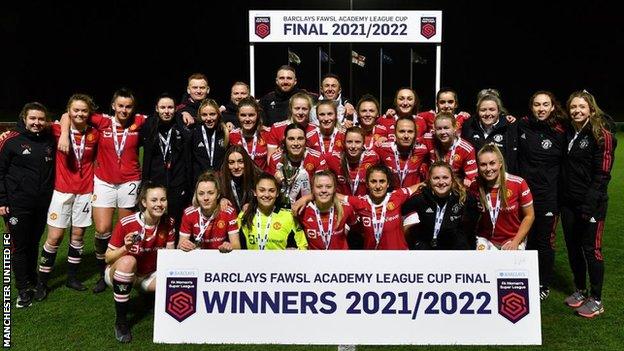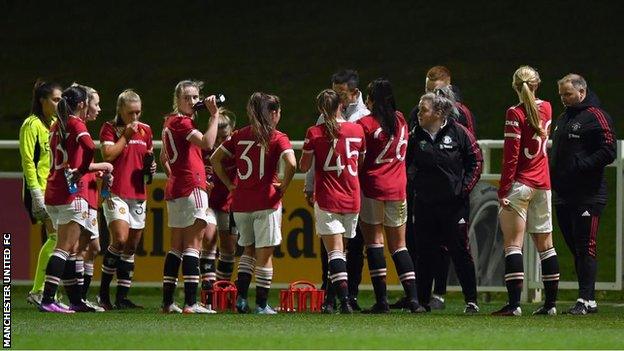How Manchester United women's academy is providing base for club's future
- Published

Manchester United beat Birmingham City 4-1 to win the Academy League Cup
"The history of the club is almost written in the walls at Manchester United. Everyone knows it's about developing homegrown talent."
Women's U21s head coach Charlotte Healy is trying to do just that, and her side's victory in the Academy Cup final last week is a sign of things to come.
Since Manchester United's women's team reformed in 2018 an academy graduate has featured in every game, but as the quality of the Women's Super League improves, the jump from youth team football also becomes bigger.
So how are the club working to bridge that gap?
First-team boss Marc Skinner was at St George's Park to watch the U21s beat Birmingham City 4-1 in the final, and said it was a "wonderful thing for us to be able to prepare the next generation".
In Skinner's current squad, the likes of Carrie Jones, Kirsty Hanson and Ella Toone have come through the youth set-up, while goalkeeper Emily Ramsey is a regular starter for WSL side Birmingham City on loan.
"There is a wonderful base talent and I want to make sure that if we can recruit from our academy, then we will, as that would be ideal," said Skinner.
Healy said the women's academy wanted to "emulate" the success of the men's side and last week's cup win was the perfect experience for her players.
"It is the whole point of the academy programme, to give the girls as many different experiences as possible," she told BBC Sport.
"When they go into a first-team environment they then know how to win games, how to play in finals, how to play under pressure and in front of crowds. Doing all of that on Wednesday was invaluable."
Allow X content?
This article contains content provided by X. We ask for your permission before anything is loaded, as they may be using cookies and other technologies. You may want to read X’s cookie policy, external and privacy policy, external before accepting. To view this content choose ‘accept and continue’.
About 95% of United's academy players are youth internationals, so Healy says "winning is important" but the focus is on preparing them for the next stage of their careers.
The majority will not go on to represent Manchester United's first team, but Healy said the academy set-up "is about so much more than that".
"We are responsible for making sure they can play at the highest level they can - whether that's our first team or others. But we don't hang our success just on trophies or how many break into the first team," she added.
"We want them to look back on the academy in five years or so and say it had a massive benefit on their life."
Naturally, though, the academy's success has shone a light on several talented stars - including prolific striker Maria Edwards, captain Poppy Lawson and Karna Solskjaer - daughter of men's legend Ole Gunnar Solskjaer.

Manchester United are three points behind leaders Aston Villa in the Northern Division Academy League with two games in hand
But Skinner is keen not to rush their development.
"It's about getting them exposed. The experience of a final is great. When they step into a first-team environment that's like a final to them. It's a big mantle to jump psychologically," he added.
"They have great abilities, but what we can't forget is that just because you perform well at that level it doesn't mean you can naturally take that to a better level. It's such a big gulf. We are doing all the different things to help them bridge the gap."
The Football Association's WSL academy manager Tony Fretwell told BBC Sport the number of youngsters breaking into first teams has increased by 310% across three seasons.
Some 53 players across the WSL academy league trained with first teams last season - the highest since the system began.
But Fretwell also admitted "there is a gap" from academy football to senior level, which the FA and WSL clubs were "working to narrow".
Homegrown youth 'special'
At Manchester United, Healy has been "redesigning" the pathway to provide new experiences and increase competition for her players.
They have included matches against boys' teams in their programme and play regular friendlies against senior women's teams competing in the National League and Championship.
United have also organised evening games in front of fans to expose players to new pressures, as well as planning busy fixture schedules to test them mentally and physically.
"We have a lot of talented players and our challenge is providing them with the right experience, game time, challenges and opportunities," added Healy.
"We work with Marc [Skinner] and his first team so players can train with them or be in the matchday squads. Those conversations happen very often.
"We have played evening games and got crowds in so we can ramp the pressure up, too. The girls played four matches in 11 days in the build-up to the cup final. When you add all of that in it was a real challenge and exposed them to that pressure."
Since joining in the summer, Skinner has been focused on guiding his side to a Champions League qualification spot in the WSL.
But the first-team boss is excited by the club's youth potential and has vowed to "manage the process".
"At a club like Manchester United, youth is really special to us, especially if they come from within. It is part of the aspect of this club.
"We want to make sure there's a seamless transition."

From Notts County to North Korea: The tale of a trillion-dollar conman who sold a dream to the oldest club in the Football League
The Sound of Peaky Blinders: Cillian Murphy shares tracks that have been integral to the feel of the programme
